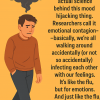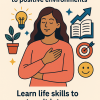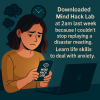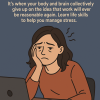
When Your Brain Won't Stop Playing Old Reruns
I was up at 3:07 a.m. again last Tuesday. Not 3:00, not 3:15—always 3:07. My brain had decided to replay that meeting from 2019 where my boss screamed at me in front of everyone. Four years later, and my nervous system still thinks we're in that conference room.
So I did what any reasonable person does at 3 a.m.—googled "why won't my brain shut up about old trauma" and fell down a research rabbit hole. Found this study by Dr. Sara Poletti that basically said: yeah, childhood trauma literally rewires your immune system to keep inflammation running forever. Cool. Love that for us.
The worst part? Two people can go through the exact same awful thing. One ends up fine-ish. The other (hi, me) gets stuck with this biological alarm system that won't shut off. Apparently it's not about being weak. It's just biology being a complete jerk.
Okay But Can We Actually Do Something About This
Look, I'm not gonna lie and say a 30-minute therapy session will fix years of messed-up wiring. That's not how any of this works.
But here's the thing—after trying literally everything (meditation apps, that breathing thing everyone talks about, even those expensive CBD gummies), I finally tried one of those brief intervention sessions. And like... it actually helped? Not in a "I'm cured!" way but in a "oh, I can get through Tuesday without wanting to quit my job" way.
The research backs this up too. Something like 50-70% of people see improvement after just one or two sessions. Again, not "trauma erased forever" improvement. More like "I have actual tools now instead of just white-knuckling through panic attacks."
What Actually Worked (After I Tried Everything Else)
That emotion naming thing
I read somewhere that Dr. Lisa Feldman Barrett discovered that specifically naming emotions helps your brain chill out. Sounded dumb. Tried it anyway.
Now I have this running list in my phone:
- "Ashamed about crying in the bathroom"
- "Furious that Dave's comment sent me spiraling"
- "Scared everyone can tell I'm not okay"
Looks absolutely unhinged when someone sees my phone. But it works. Here is something fun.
The grounding thing everyone mentions
You know, the 5-4-3-2-1 thing. Yes it sounds like something from kindergarten. Yes I felt stupid doing it the first time.
Actually, scratch that—I still feel stupid doing it. But when memories crash the party uninvited, I do it anyway. 5 things I see (usually my laptop, coffee mug, that plant I'm definitely killing). 4 things I can touch. You know the drill.
Story editing (stay with me here)
My trauma brain loves telling me "you're fundamentally broken because of what happened." Super helpful, brain. Thanks.
But you can literally just... pick a different story? Like "I survived something hard and I'm still showing up to stupid Tuesday meetings." Both true. One doesn't make me want to hide under my desk.
When These Quick Sessions Help (And When They Really Don't)
After testing this myself and reading way too much research at 3 a.m., here's what I figured out:
Good for:
- That specific presentation anxiety that makes you want to fake sick
- The Sunday night doom spiral
- Learning one damn technique that works when panic hits
Not so good for:
- Fixing your entire childhood in 30 minutes (shocking, I know)
- Complex trauma that needs actual long-term therapy
But here's the thing—even learning ONE technique that pulls you out of a spiral can change everything. Recent data shows we're losing like $8.8 trillion to workplace stress. Having any tools is better than just raw-dogging reality.
The Tuesday Presentation That Almost Killed Me
Last week I had to present quarterly numbers. Normal Tuesday task, right? My body decided we were back in 2019. Heart doing that thing where it feels like it's trying to escape through your throat. Hands shaking so bad I couldn't hold my coffee.
But this time I had that breathing technique from Confidence & Calm Under Pressure. Did the whole "name what you're feeling" thing ("terrified of public humiliation"—specific, right?).
Made it through the presentation. Not gracefully. Pretty sure everyone could tell I was dying inside. But I did it.
So Now What
If you're reading this at some ungodly hour because your brain is being a jerk about something that happened forever ago—first of all, same. Second, you're not broken. You're just dealing with biology doing what biology does after trauma.
One session won't magically fix everything. God, I wish. But it might give you actual tools instead of just hoping Tuesday doesn't suck. That's been worth 30 minutes for me. Even at 3:07 a.m.
Wait, that sounds like I'm trying to sell you something. I'm not. I mean, I am recommending it because it helped me, but... you know what I mean.








